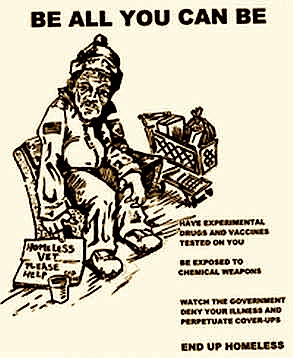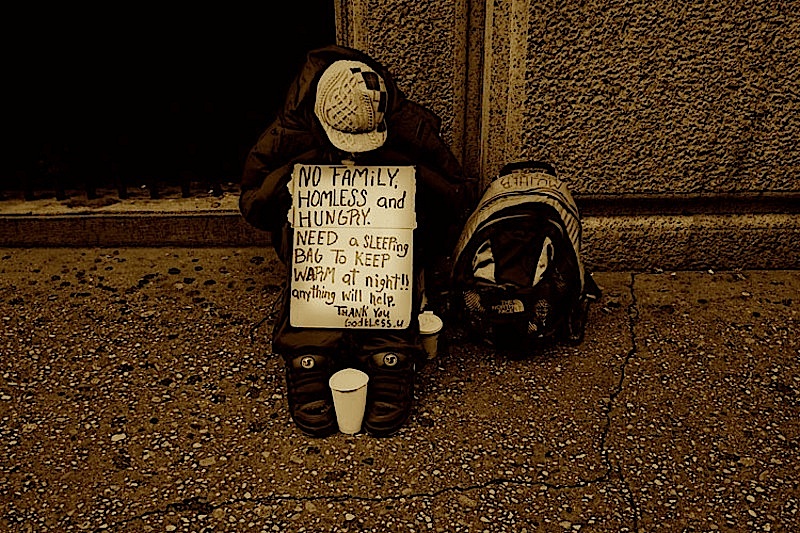 BY JEFF DEENEY A recent study indicates that some 200,000 American war veterans are currently homeless. Some 1,500 of those are Iraq War vets. The homeless services field has been anticipating the arrival of Iraq War vets in shelters and drop in centers across the nation since the war started. When I worked for the Philadelphia Committee to End Homelessness we regularly discussed how to handle the impending surge of vets that were bound to show up in the day center at 802 N. Broad. As of my departure from that agency a couple months ago we still hadn’t really seen an appreciable number of troops fresh from Iraq but according to the Times they are starting to pop up. There are a lot of reasons to believe Iraq War vets will start to present at city shelters and urban street encampments in droves over the next couple years. PTSD correlates with subsequent alcohol and drug abuse, and therefore homelessness. There certainly won’t be any shortage of trauma sufferers returning from Baghdad. The Army seems to regard expressed trauma as a sign of weakness and isn’t known to treat it seriously. NPR did a great job of showing exactly how little the military does for stressed vets.
BY JEFF DEENEY A recent study indicates that some 200,000 American war veterans are currently homeless. Some 1,500 of those are Iraq War vets. The homeless services field has been anticipating the arrival of Iraq War vets in shelters and drop in centers across the nation since the war started. When I worked for the Philadelphia Committee to End Homelessness we regularly discussed how to handle the impending surge of vets that were bound to show up in the day center at 802 N. Broad. As of my departure from that agency a couple months ago we still hadn’t really seen an appreciable number of troops fresh from Iraq but according to the Times they are starting to pop up. There are a lot of reasons to believe Iraq War vets will start to present at city shelters and urban street encampments in droves over the next couple years. PTSD correlates with subsequent alcohol and drug abuse, and therefore homelessness. There certainly won’t be any shortage of trauma sufferers returning from Baghdad. The Army seems to regard expressed trauma as a sign of weakness and isn’t known to treat it seriously. NPR did a great job of showing exactly how little the military does for stressed vets.
*
The fact that the military isn’t the best place to look for needed emotional healing and trauma recovery will be complicated by the fact that many volunteers for the Iraq War came from the poorer end of the socioeconomic spectrum and are therefore more vulnerable to homelessness. Especially in the big east coast urban centers you see a lot of young black and Latin kids who signed up hoping to find a way out of the ghetto. When they return, traumatized, dazed and confused, the distance between them and the streets will be far shorter than it might be for a soldier from a more affluent background. Without the intact social networks and financial safety nets that soldiers from more affluent backgrounds can lean on if needed, winding up in a place like Ridge Shelter won’t take much, nor will it take long. All it requires is the bad decision to use drugs and booze to medicate the lasting impact of battlefield trauma.
a lot of young black and Latin kids who signed up hoping to find a way out of the ghetto. When they return, traumatized, dazed and confused, the distance between them and the streets will be far shorter than it might be for a soldier from a more affluent background. Without the intact social networks and financial safety nets that soldiers from more affluent backgrounds can lean on if needed, winding up in a place like Ridge Shelter won’t take much, nor will it take long. All it requires is the bad decision to use drugs and booze to medicate the lasting impact of battlefield trauma.
*
Frederick Johnson, from Chester, Pa, has already lived this out:
“Frederick Johnson, 37, an Army reservist, slept in abandoned houses shortly after returning to Chester, Pa., from a year in Iraq, where he experienced daily mortar attacks and saw mangled bodies of soldiers and children. He started using crack cocaine and drinking, burning through $6,000 in savings.
‘I cut myself off from my family and went from being a pleasant guy to wanting to rip your head off if you looked at me wrong,’ Mr. Johnson said. On the street for a year, he finally checked in at a V.A. clinic in Maryland and has struggled with PTSD, depression, and drug and alcohol abuse. The V.A. has provided temporary housing as he starts a new job.” Hopefully Frederick has a full recovery.
Maybe the question of homeless veterans, which the Inky reports are already one quarter of the homeless population, should be on Mayor Nutter’s already heaping plate. The homeless numbers in Philly are already at ten year highs, a surge of vets coming home from the war and winding up on the Parkway could create a real crisis. Hopefully the city will be ready to receive and serve them.
PREVIOUSLY: Fear Of A Homeless Planet
ABOUT THE AUTHOR: Jeff Deeney is a freelance writer who has contributed to the City Paper and the Inquirer. He focuses on issues of urban poverty and drug culture.

